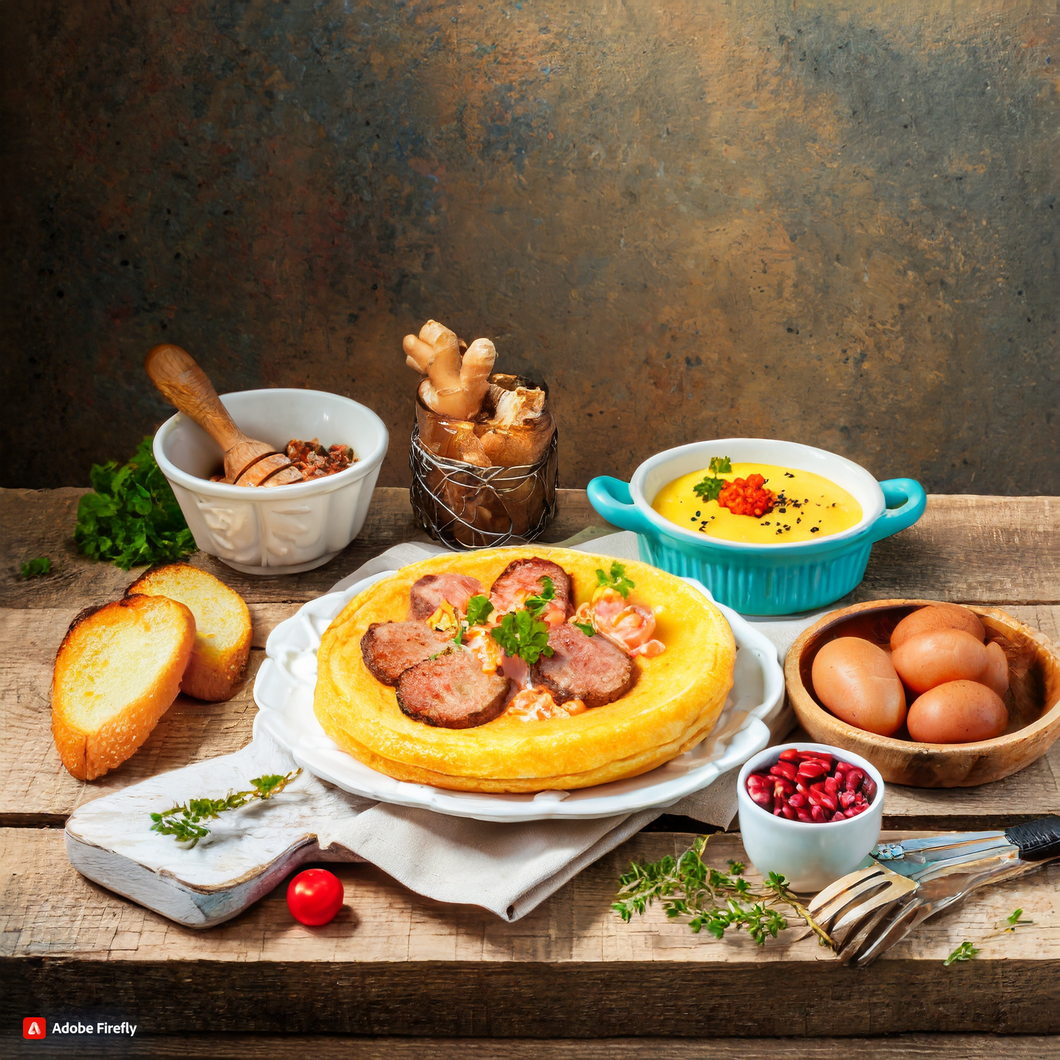Introduction
Culinary Foundations: A Beginner’s Journey to Cooking Excellence is a comprehensive guide for those who are new to the world of cooking. This book is designed to provide beginners with the essential knowledge and skills needed to become confident and successful in the kitchen. From basic cooking techniques to understanding flavor profiles and creating delicious dishes, this book covers all the fundamentals of cooking. Whether you are a complete novice or have some experience in the kitchen, Culinary Foundations will help you develop a strong foundation and set you on the path to cooking excellence.
5 Essential Techniques for Mastering Culinary Foundations

Are you a beginner in the world of cooking? Do you want to improve your culinary skills and become a master in the kitchen? Look no further, because in this article, we will be discussing the 5 essential techniques for mastering Culinary Foundations.
1. Knife Skills
The first and most important technique in cooking is mastering knife skills. A sharp and well-maintained knife is a chef’s best friend. It is essential to learn how to hold a knife properly, how to chop, dice, and slice ingredients efficiently. With good knife skills, you can save time and effort in the kitchen and achieve consistent results in your dishes. Practice makes perfect, so don’t be afraid to spend some time honing your knife skills.
2. Understanding Heat
Heat is a crucial element in cooking. It can transform the taste, texture, and appearance of your food. Understanding heat and how to control it is essential in mastering Culinary Foundations. Different cooking methods require different levels of heat, and it is crucial to know when to use high heat, medium heat, or low heat. For example, high heat is suitable for searing meats, while low heat is ideal for simmering sauces. Experiment with different heat levels and pay attention to how it affects your food.
3. Seasoning
Seasoning is the key to bringing out the flavors in your dishes. It is not just about adding salt and pepper; it is about balancing the flavors in your food. Too much salt can ruin a dish, while too little can make it taste bland. Experiment with different herbs, spices, and seasonings to find the perfect balance for your taste buds. Remember to taste your food as you cook and adjust the seasoning accordingly.
4. Sauces and Stocks
Sauces and stocks are the building blocks of many dishes. They add depth and richness to your food and can elevate a simple dish to a restaurant-quality meal. Learning how to make basic sauces and stocks, such as a roux-based sauce or a chicken stock, is essential in mastering Culinary Foundations. These sauces and stocks can also be used as a base for other sauces and dishes, so it is worth investing time in learning how to make them.
5. Proper Plating
They say we eat with our eyes first, and this is especially true in the culinary world. Proper plating can make a dish look more appetizing and can enhance the overall dining experience. When plating, consider the colors, textures, and shapes of your ingredients. Use garnishes to add a pop of color and make your dish look more visually appealing. Remember, presentation is just as important as taste.
In conclusion, mastering these 5 essential techniques for Culinary Foundations will set you on the path to cooking excellence. However, it is essential to remember that cooking is an ongoing learning process. Don’t be afraid to make mistakes and experiment with different ingredients and techniques. With practice and determination, you will soon become a master in the kitchen. Happy cooking!
The Importance of Knife Skills in Building Culinary Foundations
Are you a beginner in the world of cooking? Do you dream of creating delicious and impressive dishes like the ones you see on cooking shows? Well, you’re not alone. Many people have a passion for cooking but are intimidated by the thought of stepping into the kitchen. However, the key to becoming a great cook lies in building strong Culinary Foundations. And one of the most essential skills in this journey is mastering knife skills.

You may be wondering, why are knife skills so important? Can’t I just use a food processor or pre-cut ingredients? While these tools can certainly make cooking easier, they cannot replace the precision and control that comes with using a knife. Knife skills are the foundation of all cooking techniques and are crucial in creating consistent and evenly cooked dishes.
First and foremost, mastering knife skills will save you time in the kitchen. Have you ever spent hours chopping vegetables for a recipe, only to end up with uneven and different-sized pieces? With proper knife skills, you can cut through ingredients quickly and efficiently, saving you precious time. This is especially important when preparing multiple dishes or cooking for a large group of people.
Moreover, using a knife correctly can enhance the flavor and texture of your dishes. When ingredients are cut uniformly, they cook at the same rate, resulting in a more evenly cooked dish. This is particularly important when cooking meats, as unevenly cut pieces can result in some parts being overcooked while others are undercooked. Additionally, when ingredients are cut properly, they release their natural flavors and aromas, making your dish more flavorful.
Another benefit of mastering knife skills is safety. Using a knife can be intimidating, but with proper techniques, you can minimize the risk of accidents. Always hold the knife with a firm grip and keep your fingers curled under to avoid cutting yourself. Also, make sure to use a sharp knife as it requires less force to cut through ingredients, reducing the chances of slipping and injuring yourself.
Now that you understand the importance of knife skills, let’s dive into some basic techniques that will help you build a strong foundation. The first and most crucial technique is the “pinch grip.” This involves holding the knife with your dominant hand, placing your index finger and thumb on the blade, and wrapping your remaining fingers around the handle. This grip gives you better control and precision when cutting.
Next, it’s essential to learn the proper way to hold and guide the ingredients. For round or cylindrical ingredients like carrots or onions, use the “claw grip.” This involves curling your fingers under and using your knuckles to guide the knife. For flat ingredients like garlic or herbs, use the “bridge grip.” This involves placing your non-dominant hand on top of the ingredient, using your fingers as a guide for the knife.
Now that you have a good grip on the knife and ingredients, it’s time to learn some basic cutting techniques. The most common and versatile technique is the “chop.” This involves cutting ingredients into small, even pieces by repeatedly bringing the knife down in a rocking motion. Another essential technique is the “slice,” which involves cutting ingredients into thin, even pieces by moving the knife back and forth in a horizontal motion.
Lastly, it’s crucial to maintain your knives properly. Always use a cutting board to protect the blade and sharpen your knives regularly to ensure they are in top condition. A dull knife not only makes cutting more challenging but also increases the risk of accidents. Read Healthy Dessert Recipes.
In conclusion, mastering knife skills is an essential step in building strong Culinary Foundations. It not only saves time and enhances the flavor of your dishes but also ensures safety in the kitchen. So, don’t be afraid to pick up a knife and start practicing. With time and practice, you’ll be on your way to cooking excellence. Happy cooking!
From Basic Ingredients to Gourmet Dishes: A Guide to Culinary Foundations
Are you a beginner in the kitchen, eager to learn the art of cooking? Or perhaps you have some experience but want to take your skills to the next level? Whatever your level of expertise may be, mastering the foundations of cooking is essential for creating delicious and impressive dishes. In this article, we will take you on a journey from basic ingredients to gourmet dishes, providing you with a guide to Culinary Foundations.
The first step in any culinary journey is understanding the basic ingredients. From vegetables and fruits to meats and grains, each ingredient has its own unique flavor and texture. It is important to learn how to properly select, store, and prepare these ingredients to bring out their best qualities. For example, when choosing vegetables, look for ones that are firm and brightly colored. When storing them, keep them in the refrigerator and use them within a few days for optimal freshness. And when preparing them, make sure to wash them thoroughly and cut them into uniform sizes for even cooking.

Next, let’s talk about herbs and spices. These are the key to adding depth and complexity to your dishes. While it may seem overwhelming at first, start by experimenting with a few basic herbs and spices such as garlic, thyme, and black pepper. As you become more comfortable, you can expand your collection and learn how to use them in different ways, such as infusing oils or making rubs for meats. Remember, a little goes a long way with herbs and spices, so start with small amounts and taste as you go.
Now that you have a good understanding of ingredients, it’s time to learn some basic cooking techniques. These techniques are the building blocks of cooking and will help you create a wide range of dishes. Some essential techniques to master include sautéing, roasting, and braising. Sautéing involves cooking food quickly in a small amount of oil over high heat, while roasting involves cooking food in the oven at a high temperature. Braising, on the other hand, involves cooking food slowly in a liquid, such as broth or wine, over low heat. Each of these techniques has its own unique benefits and can be used for a variety of ingredients.
As you continue to develop your skills, it’s important to also learn about flavor profiles. This refers to the combination of flavors that work well together in a dish. For example, sweet and savory flavors often complement each other, while acidic and spicy flavors can balance each other out. Understanding flavor profiles will help you create well-balanced and delicious dishes. Don’t be afraid to experiment and try new combinations to find what works best for you.
Now that you have a solid foundation of ingredients, techniques, and flavor profiles, it’s time to take your cooking to the next level with gourmet dishes. Gourmet cooking involves using high-quality ingredients and advanced techniques to create complex and visually stunning dishes. This may seem intimidating, but with practice and patience, you can achieve gourmet results in your own kitchen. Start by trying out some classic gourmet recipes, such as Beef Wellington or Coq au Vin, and then put your own spin on them by incorporating your favorite ingredients and flavors.
In conclusion, mastering the foundations of cooking is essential for anyone looking to become a skilled cook. By understanding ingredients, learning basic techniques, and experimenting with flavor profiles, you can create delicious dishes that will impress your family and friends. And with practice, you can take your cooking to the next level and create gourmet dishes that will make you feel like a professional chef. So don’t be afraid to get in the kitchen and start your culinary journey today!
Q&A – Culinary Foundations
Q: What are some basic cooking techniques that beginners should learn?
A: Some basic cooking techniques that beginners should learn include knife skills, sautéing, roasting, and boiling.
Q: What are some essential kitchen tools for a beginner cook?
A: Some essential kitchen tools for a beginner cook include a chef’s knife, cutting board, measuring cups and spoons, pots and pans, and a wooden spoon.
Q: What are some common ingredients used in Culinary Foundations?
A: Some common ingredients used in Culinary Foundations include salt, pepper, herbs and spices, oils and vinegars, onions and garlic, and various types of meats and vegetables.
Conclusion for Culinary Foundations
In conclusion, Culinary Foundations: A Beginner’s Journey to Cooking Excellence is a comprehensive guide for those looking to improve their cooking skills. It covers all the essential techniques, ingredients, and equipment needed to create delicious and impressive dishes. With step-by-step instructions and helpful tips, this book is perfect for beginners who want to develop a strong foundation in cooking.
By following the lessons and practicing regularly, readers can embark on a journey towards culinary excellence and become confident and skilled cooks. Whether for personal enjoyment or a potential career in the culinary industry, this book is a valuable resource for anyone looking to elevate their cooking abilities.
Please follow us on linkedin. You can learn all best canadian food recipes you can check our Culinary 1TouchFood Youtube and Telegram 1TouchFood page. Don’t forget Fighting Obesity Magazine and Radio Cooking.

